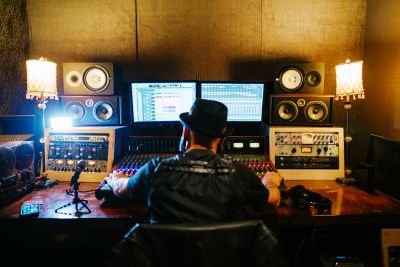Depending on your taste in music, you’ve likely seen a second name cited alongside your favorite artist’s—the producer. If you are unfamiliar with what the producer does or their responsibilities, you may be wondering why their name gets as much attention as the performer. So, what responsibilities could a music producer have?
Music producers are responsible for creating music, capturing performances, manipulating recordings, and preserving the final product to be distributed to the listener. But making music is only half the job. Without a producer, musicians might not ever meet their deadlines.
Even if you’re unaware of who the producer is, all recorded music has gone through some form of production. This puts the producer at the heart of the recording process. Here’s what they do to make your favorite songs.
An Overview of a Music Producer’s Job
Music producers help artists create their unique sound by layering instrumentation and samples into their songs and albums. They work with the artist to produce an overall sonic theme and feel for the music.
Producers work behind the scenes to create in reality what the artist has in their head. Most artists do not have the musical range to create every aspect of their music, so this is where the producer comes in. When you listen to a song, multiple things are going on at once:
- Guitars
- Pianos
- Saxophones
- Synthesizers
- Backup vocals
- Bass machines
The producer schedules other musicians to record their performances or uses samples of other performances to create these sounds. They then layer them into the music and produce a final, cohesive song.

Music Producers Operate Behind the Scenes
Music producers do far more than just record music. They act as a manager, co-writer, musician, and mediator for the artist. They are the backbone behind the scenes.
As the music industry has grown, the role of a music producer has also changed. They are no longer just the guy sitting in a recording booth telling artists to give another take.
Nowadays, music producers have a hands-on role in the development and creation of an artist’s music. But that’s not all. Here are four of the most important roles music producers play:
Music Producers Act Like Managers
Producers book musicians, meet the artists’ budgets, manage schedules, and guarantee that artist gets representation at a higher level in the music industry.
It may come as a surprise but music producers are the ones responsible for booking artists into a recording session and walking them through the schedule. The booking must be within the musician’s budget and it must also live up to the artist’s desired technical requirements.
Artists often pick a music producer because the producer has proven themselves to be a professional who can craft their vision into reality and work within the complexities of the music industry.
Producers know how to work with labels and can even get an artist signed if they think they are worthy of bigger representation.
Even indie projects benefit from working with an experienced producer. The producer can help them craft a polished final product by keeping the band on schedule and even market to a wider audience than the indie artist would reach on their own.
Music Producers Oversee Artists’ Performances
Producers are in charge of finding the best recording and guaranteeing that the final product is something that listeners will play over and over again.
When you imagine a music producer, you probably think of someone sitting in a recording booth speaking to an artist over a microphone. While this isn’t the entirety of a producer’s job, it is one of their most crucial responsibilities.

When an artist records their vocals, they don’t always give their best performance. It’s up to the producer to listen closely, encourage the artist, and find the best recording that listeners will feel inspired or moved by. Producers are essentially ongoing critics who push artists to give their best.
Once the producer is happy with a recording, they can then layer the vocals or performance into the rest of the song. They add in backup instrumentation or singers and create a frame around the artist to elevate the entire performance.
Music Producers are Musicians
Producers personally create beats, background instrumentations, and compositions. Depending on the song, you might be listening to the producer perform.
Nowadays, many producers are personally responsible for creating the music behind an artist’s performance. They may be multi-instrumentalists, such as Aaron Dessner, who helped produce Taylor Swift’s album Folklore, or masters of sampling such as Kanye West and Tyler the Creator.

Hip-Hop and electronic producers spend hours and even days crafting beats and layering samples from other works into a complex and textured sound.
However, before they can use a sample, they first have to get the rights to the music they want to use. This can take time and a lot of communication between artists.
Music Producers Mediate Their Artists
Music producers must know how to smooth conflicts and negotiate compromises. A producer will make sure all complaints and suggestions are acknowledged. This allows a project to be completed on time.
The best music producers balance artists’ creativity and ambitions with the reality of a timetable. They help tame the artist’s most wild proclivities and keep the project on track to finish. Sometimes, though, this means dealing with the artist’s worst eccentricities.
It’s no secret that some artists are difficult to work with. Their artistic visions push boundaries and sometimes create rifts between coworkers.
Fortunately, music producers are used to dealing with this and can mediate personalities. Whether it means encouraging artists or advising them against a creative direction, the music producer becomes a mediator and a therapist.
Conclusion
Music producers are responsible for capturing the artist at their best, encouraging the artist to grow, contributing to the musicality of a record, and managing when the artist can come into the studio to perform. Music production is a full-time and multi-faceted job that takes years to master yet often goes unrecognized.
